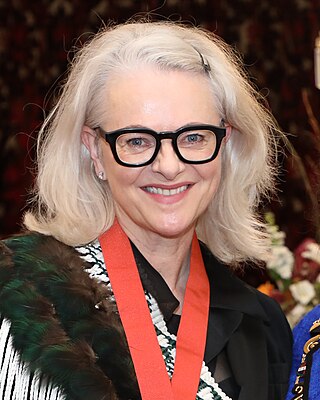
Sir Derek George Jacobi is an English actor. He is known for his work at the Royal National Theatre and for his film and television roles. He has received numerous accolades including a BAFTA Award, two Olivier Awards, two Primetime Emmy Awards, two Screen Actors Guild Awards, and a Tony Award. He was given a knighthood for his services to theatre by Queen Elizabeth II in 1994.

William James Te Wehi Taitoko, better known by his stage name Billy T. James, was a New Zealand entertainer, comedian, musician and actor. He became a key figure in the development of New Zealand comedy and was a household name during his lifetime.

Roger Lindsey Donaldson is an Australian and New Zealand film director, screenwriter, and producer. His 1977 debut film, Sleeping Dogs, is considered landmark work of New Zealand cinema, as one of the country’s first films to attract large-scale critical and commercial success. He has subsequently directed 17 feature films, working in Hollywood and the United Kingdom, as well as his native country.

Lani Tupu, billed variously as Larney Tupu, John Tupu and Lani John Tupu, is a New Zealand-born actor of Samoan and English descent. Also known as Lani Tupu Jr.
The following lists events that happened during 1975 in New Zealand.
The following lists events that happened during 1977 in New Zealand.
Peter Bruce Smith was a New Zealand actor. He appeared in iconic New Zealand films such as The Piano (1993) and Once Were Warriors (1994), as well as working on well known television shows, including appearances on The Billy T James Show (1990) and Shortland Street in 1999.
Dean Leo Parker was a New Zealand screenwriter, playwright, journalist and political commentator based in Auckland. Known for the screenplay of iconic film Came a Hot Friday which he co-wrote with Ian Mune, the television film Old Scores and recent play Midnight in Moscow and was awarded Laureate of the New Zealand Arts Foundation in 2010.

Robyn Jane Malcolm is a New Zealand actress, who first gained recognition for her role as nurse Ellen Crozier on the soap opera Shortland Street. She is best known for playing Cheryl West, matriarch to a sometimes criminal working-class family, in the television series Outrageous Fortune. She has also worked in Australia, including roles in the TV series Rake and Upper Middle Bogan. She plays the lead role in the six-part 2023 NZ drama After the Party.

Larry George Parr, a New Zealand film and television producer, writer, and director, has been involved in the New Zealand film industry since the 1970s.

Roy Harwood Billing is a New Zealand television actor, now based on Waiheke Island, New Zealand. He was brought up in Ruawai, Northland, New Zealand. Billing spent almost three decades living and working in Australia. He became widely known for his role as organised-crime boss “Aussie Bob” Trimbole in the TV series Underbelly.
New Zealand film and television awards have gone by many different names and have been organised by different industry groups. As of 2017, New Zealand has relaunched a standalone New Zealand Television Awards after a five-year hiatus. The film awards continue to be sporadically awarded as the Rialto Channel New Zealand Film Awards (Moas).
Martyn Sanderson was a New Zealand actor, director, producer, writer and poet.

Dame Miranda Catherine Millais Harcourt is a New Zealand actress and acting coach.

Alfred Charles Hanlon was a New Zealand lawyer, who, according to the Dictionary of New Zealand Biography, "was one of the most outstanding criminal advocates in New Zealand's history". He was born in Dunedin, New Zealand, where he lived and died, though he represented clients nationwide. Hanlon represented at least 16 people charged with murder, but he is best known for his first defence case, in which he represented the only woman to be hanged in New Zealand, Minnie Dean. Dean was the only murder defendant of Hanlon's to be hanged.

Rachel Jessica Te Ao Maarama House is a New Zealand actress and director. She is best known for her roles in the films of Taika Waititi. She has received numerous accolades including an Arts Laureate, NZ Order of Merit, 'Mana Wahine' from WIFT NZ and Te Waipuna a Rangi for her contributions as an actor and director.

Ginette Denise McDonald is a New Zealand actress, and television producer and director, best known for her comedic alter ego, "Lyn of Tawa".

Bruce Robert Allpress was a New Zealand actor.
Judy Coralyn Sylvia Callingham is a New Zealand scriptwriter, television presenter and journalist. Since the 1970s, she has worked on numerous New Zealand television dramas including Close to Home, Homeward Bound, Duggan and Marlin Bay. She is a former deputy chair of NZ On Air, and together with her husband Brian Edwards runs a media training consultancy company.

Peter John Hayden is a New Zealand actor, and television series writer, producer and presenter. Hayden is known to New Zealand audiences as the writer and narrator of nature documentaries series including Wild South and Journeys Across Latitude 45.













